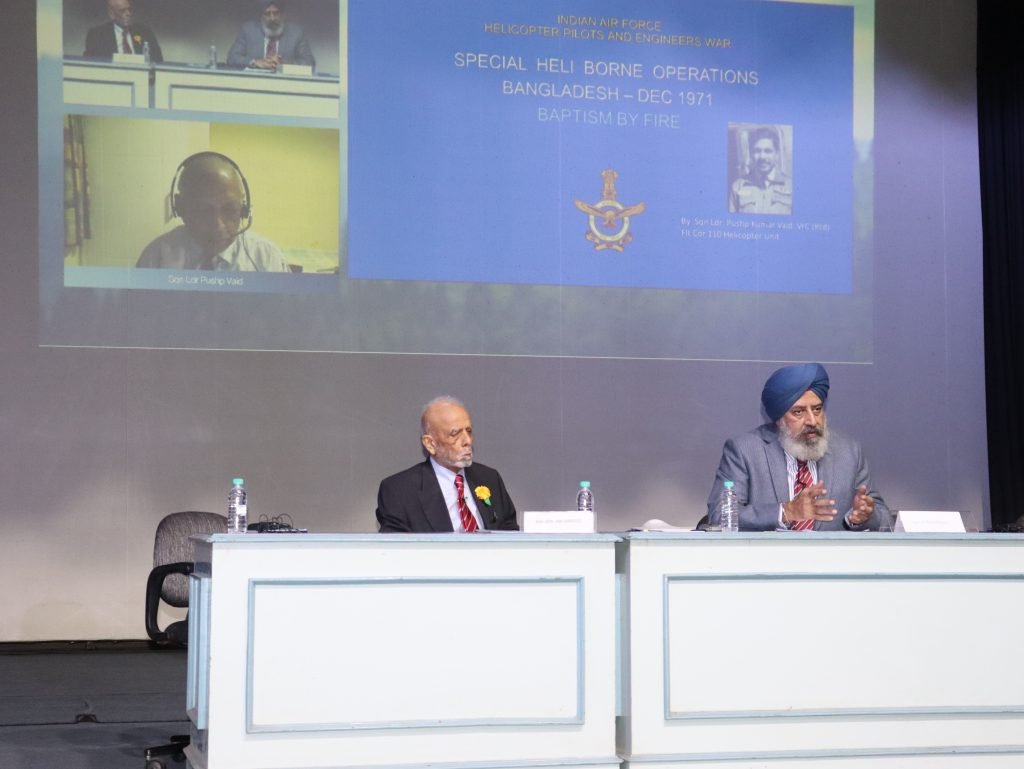Air operations: 1971 — The war which shaped the subcontinent [Event]

This year marks the 50th anniversary of the war between India and Bangladesh. A delightful and informative two-day event on military history and strategy, focusing on the 1971 war, was conducted at United Service Institution of India (USI), a national security and defence services think tank based in New Delhi, India on October 9th and 10th, 2021. The festival was a part of several literature and arts festivals that Valley of Words (VoW), a literary organization based in Dehradun, conducts annually. This episode on military history and strategy was first among many theme-centric festivals that VoW is going to pull off in the coming weeks. It brought together army veterans of India and Bangladesh, diplomats and authors to the table, to provide a hindsight view of the 1971 war.
Here are the excerpts from the session titled “Air Operations”
1. Air War in the East
The session invited Air Marshal Harish Masand, a decorated 1971 war veteran and a pioneer of the MiG-29 in the Indian Air Force. He is especially known for his writings on airpower and national security matters. The session presented glimpses of the Air Marshal’s encounter in the Bangladesh Liberation War between India and Pakistan. Speaking of actionable intelligence, he said, “due to the lack of reliable photographs of the airfield to operate on, it actually caused a lot of problems initially”. However, many developments have happened since the 1965 war. In the 1971 war, there was better infrastructure like squadrons supporting the army, tactical air centres and qualified fighter pilots. Emphasizing on the importance of air dominance and ending the session, Air Marshal Harish Masand said, “If not the dominance in the air, the Lighting campaign would not have been possible which led to the surrender of Dhaka”
Watch Air Marshal Harish Masand speak more on the topic on YouTube: Air Operations: Air War in the East – Valley of Words 2021
2. Air War in the West
The session invited Mr Jagan Mohan, who has immense knowledge of the Indian Air Force. He talked about roles assigned to the various aircraft. “Texan” Harvard was initially responsible for providing close air support, disrupting supply lines, attacking pillboxes, and installing supports. AVM Manmohan Bahadur talked about the three Vampires lost in the first strike in the war and hence were only equipping the fighter training wing to provide introductory training. He also talked about Vampires being in full swing in capturing point 1.3620 which was right above Kargil. Ending the session, both personalities acknowledged the courage of the officers and airmen who volunteered to participate thus, bringing victory for India.
Watch the full video on YouTube: Air Operations: Air War in the West – Valley of Words 2021
3. Experiences of first Heliborne Operation
The session invited Sqn Ldr. Pushp Kumar Vaid VrC (Rtd), Flt Crd 110 Helicopter Unit as the keynote speaker. The session invited an additional guest who was none other than General Ian Cardozo, AVSM, SM.
The year 1971 marked a major curve for India given the outrageous war which not only helped India venture into its military capabilities but also gained many ‘first’ experiences. The session’s primary focus stood out in correlation to the Heliborne operations, which were deployed for the first time in the Battle of Sylhet, 1971.

The daunting experiences of 1971 as highlighted by Sqn Ldr. Pushp Kumar Vaid provides an insight into the strategic game adopted by the Indian Air Force to mark a landmark victory back then. He mentioned, “Mi4 helicopter is absolutely the most amazing helicopter that I have flown. Very reliable.” He stressed how they were alerted about the then-incoming war and how the training was completed overnight. The priority was given to the evacuation of casualties however, they left no stone unturned to complete all assigned missions which included dropping loads and providing arms and ammunition.
He reminisced about the sudden ambush he met during his operation in Sylhet and how he and the other air force members dodged bullets to further move ahead with the remaining part of the mission. He went about the entire mission which landed him into earning the prestigious Vir Chakra Award.
General Cardozo shared his remarks on the same, as he was also part of the very first SHPO which was carried out in Sylhet. He highlighted how this was the quickest airborne operation in the history of the Indian Military. The experiences shared by both reiterated the success of the Indian Military and the paramount sacrifices that were made to write the glorifying history of India and its military.
To know more about the first heliborne operation, watch: Air Operations: Experience of First Heliborne Operation – Valley of Words 2021


















